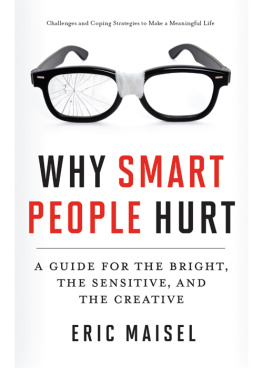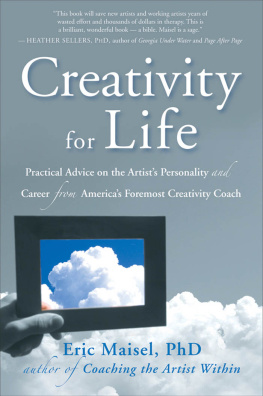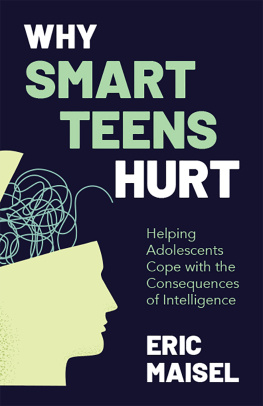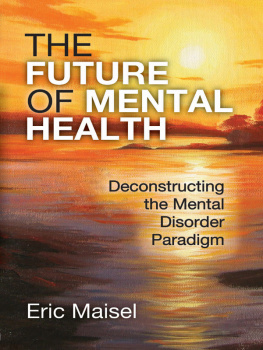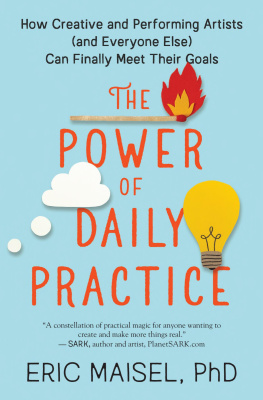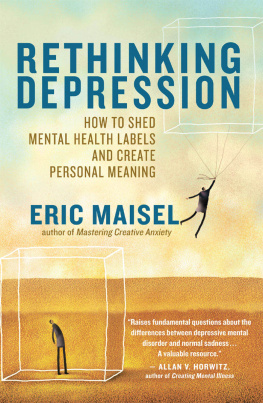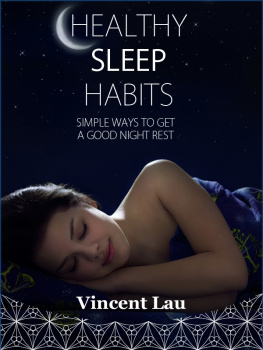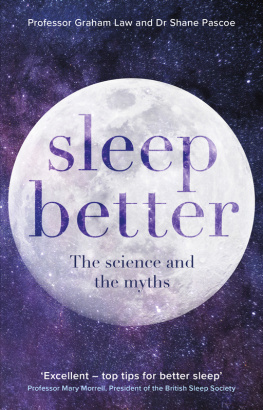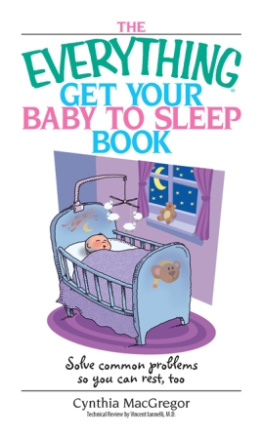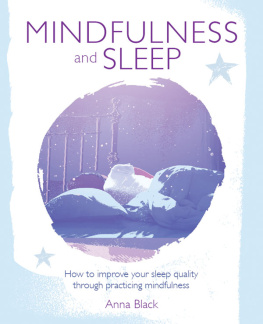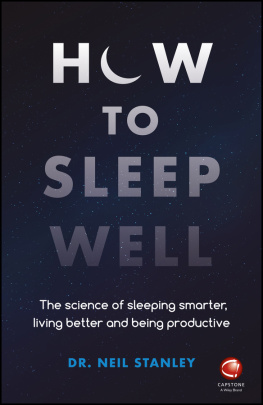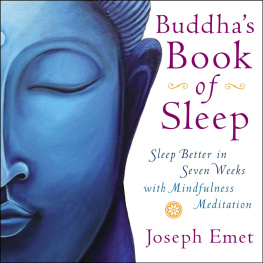THE MAGIC OF SLEEP
THINKING
How to Solve Problems, Reduce Stress, and Increase Creativity While You Sleep
Eric Maisel, PhD
with Natalya Maisel

Mineola, New York
Copyright
Copyright 2000 by Eric Maisel
All rights reserved.
No part of this publication can be reproduced, stored in a retrieval system, or transmitted in any form or by any means, electronic, mechanical, photocopying, recording, or otherwise, without the prior permission of Eric Maisel.
Bibliographical Note
This Ixia Press edition, first published in 2018, is an unabridged republication of the work originally published by Adams Media Corporation, Holbrook, Massachusetts, in 2000.
Library of Congress Cataloging-in-Publication Data
Names: Maisel, Eric, 1947author. | Maisel, Natalya, author.
Title: The magic of sleep thinking : how to solve problems, reduce stress, and increase creativity while you sleep / Eric Maisel, with Natalya Maisel.
Other titles: Sleep thinking
Description: Mineola, New York : Ixia Press, an imprint of Dover Publications, Inc., 2018. | Originally published under title: Sleep thinking : the revolutionary program that helps you solve problems, reduce stress, and increase creativity while you sleep. Holbrook, Mass. : Adams Media Corp., c2000. | Includes bibliographical references and index.
Identifiers: LCCN 2017054674| ISBN 9780486824284 (alk. paper) | ISBN 0486824284 (alk. paper)
Subjects: LCSH: Problem solving. | Dreams.
Classification: LCC BF1099.P75 M35 2018 | DDC 154.6dc23
LC record available at https://lccn.loc.gov/2017054674
IXIA PRESS
An imprint of Dover Publications, Inc.
Manufactured in the United States by LSC Communications
82428401 2018
www.doverpublications.com/ixiapress
for Ann
CONTENTS
INTRODUCTION
I started thinking about the ideas in this book more than thirty years ago, when I began writing my first novel. Even back then, I was curious about the workings of the brain during the nighttime. While other people seemed interested in and even obsessed by dreams, I was more taken with the idea of the brain as a nighttime problem-solving organ that never went off line and that needed clear direction if it was going to work effectively during sleep.
I knew from personal experience and from the reports of famous scientists, inventors, and artists that the brain workedand worked beautifullywhile we slept. But at that time, I had no coherent picture of how it could be enlisted to solve problems during the night. I continued writing fiction, trained as a psychotherapist, and became a creativity consultant and college teacher, during which time my interest in the powers of the brain at night intensified.
For the past fifteen years, Ive worked with creative and performing artists, talking with them about creativity as well as their mental health problems. Out of these experiences have come books on the creative life, including The Creativity Book, Fearless Creating, Deep Writing, and A Life in the Arts. In addition, for the last twelve years Ive helped adult students in their thirties, forties, and fifties engage in personal and professional assessment as part of their return to college.
As I counseled, taught, interacted with, and learned from all these people, I was continually struck by how much went on in their lives while they were asleep. I listened closely to what they had to say and began to see how they solved problems, worked on creative projects, came up with insights, reduced their stress, and even changed their lives as they slept. I asked a lot of questions. The more I learned, the more comfortable I became with suggesting to new clients that they use sleep as a time to problem solve. In this way, I began to see how sleep thinking could be made into a systematic program.
I enlisted my daughter, Natalya, to help me research the sleep literature. Together we learned about the peculiarities and special function of non-REM (NREM) sleep, listened to the stories of problem solving and creating recounted by sleep subjects, and acquainted ourselves with the standard and more obscure experimental results. I also asked friends and colleagues about their sleep thinking experiences. Because the subject fascinated them, they began to ask their friends and colleagues, who in turn communicated their experiences to me.
So this book grew. Some of the stories in this book are direct and unadorned, some are altered to maintain confidentiality, and some are composites put together from the experiences of various people to illustrate the points I want to make. I hope that youll find the sleep thinking program outlined here both interesting and useful. I firmly believe that if you allow it, sleep thinking can change your life.
THE MAGIC OF SLEEP
THINKING
UNDERSTANDING SLEEP THINKING
M y goal in this book is to teach you how to use sleep thinking to solve your problems, reduce your stress, upgrade your personality, and increase your creativity. After a bit of an introduction, Ill ask you to begin your own sleep thinking program, which will involve a little self-inquiry, a new bedtime routine, a new morning routine, and a few other changes and additions to your current lifestyle. I hope youll give this program a try. If you do, your experience will be remarkable.
What exactly is sleep thinking? To put it simply, it is your brain continuing, while you sleep, to work on the issues and problems that matter to you. Your brain performs many functions while you sleep, and productive thinking can be one of them. But in order for your brain to work in an optimal way, it has certain needs; for example, it needs to know what its being asked to do. You can meet these needs in a simple, straightforward way. Read on.
Sleep thinking is one of the most important basic human skills. Yet most of us have heard little or nothing about it. Perhaps youve heard about a scientist who woke up with the solution to a problem or a writer who woke up with an idea for a book, but thats it. As powerful and profound as sleep thinking is, it has eluded our scrutiny because our attention has been focused solely on dreams. Because dreams are so fascinating and even magical, they have seduced us and lured us away from investigating the powers of the brain during the rest of the sleep cycle.
Dreams are such an exciting phenomenon that theyve dominated the brain research and psychotherapeutic landscapes. New books on dream interpretation come out all the time, and experiments on REM sleep (during which dreaming occurs) continue. All the attention paid to dreaming, beginning more than a century ago with Sigmund Freuds work on the meaning of dreams, has caused us to miss the other extraordinary thing that the brain can do while we sleep.
That other extraordinary thing that your brain can do while you sleep is THINK. It does this primarily during NREM (nonrapid eye movement) sleep. There are two types of sleep: REM sleep, during which most dreaming occurs, and NREM sleep, during which slower wave, higher frequency brain activity occurs. NREM sleep is further divided into four stages. The time between stage one of NREM sleep to the first REM sleep is called the first sleep cycle. There are usually about four or five such cycles a night, each lasting about ninety minutes. It is during the NREM portions of the sleep cycle, and especially during stages two, three, and four, when sleeping is deepest that thinking and problem solving occurs.
For many years, people believed that no mental activity occurred during NREM sleep. But during the past few decades, this notion has been proven false. Scientists have discovered that a large amount of high-level activity, including thinking and problem solving, occurs during these stages of sleep. David Foulkes, a sleep researcher, made some important discoveries about NREM sleep and demonstrated that people awakened during NREM sleep often reported that they were thinking. For example, when one subject was awakened, he described how he was trying to answer a question that had been posed in a class hed been teaching earlier that day. His brain was taking NREM sleep as an opportunity to problem solve and find the right answer. This is typical of NREM sleep; we use it to solve problems of all sorts.
Next page

